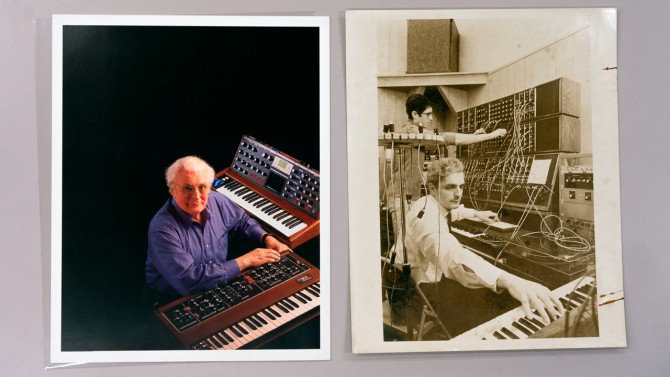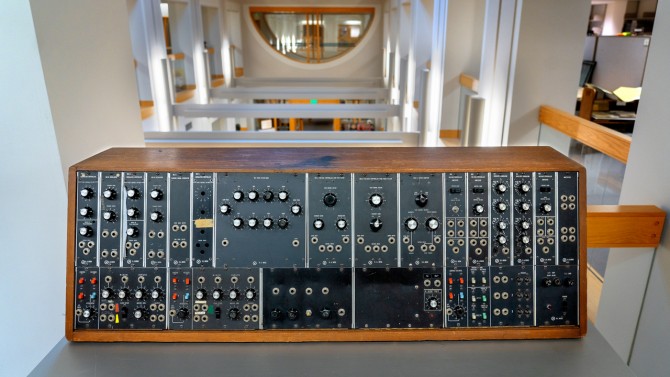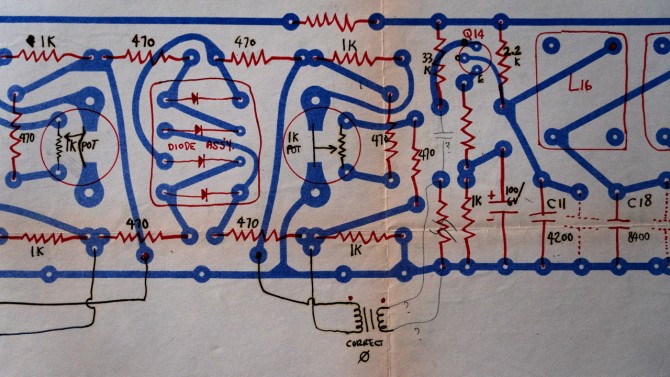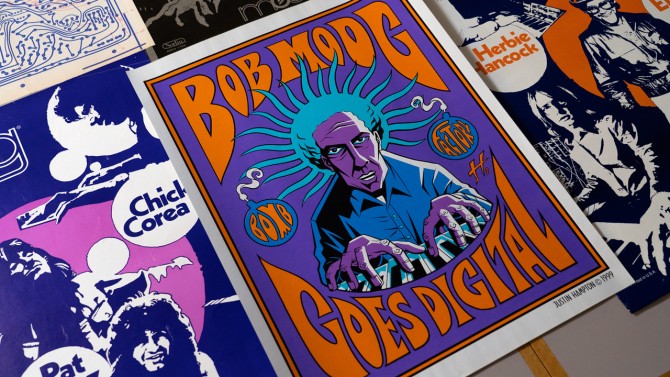To honor inventor Robert Moog, Ph.D. ’65, and to celebrate the opening of his archives at Cornell University Library, Cornell looks back at the beginnings of the Moog synthesizer, which sparked a revolution in modern music.
Moog festival to feature talks, music, exhibition
By Jose Beduya
The strange oscillations that first emanated from the small synthesizer factory of Robert Moog, Ph.D. ’65, more than a half-century ago in the quiet village of Trumansburg, New York, have become signature sounds reverberating throughout the history of electronic music – from Wendy Carlos to Daft Punk; from Emerson, Lake and Palmer to Flying Lotus.
In honor of the inventor of the now-ubiquitous Moog synthesizer, and to celebrate the opening of Moog’s archive at Cornell University Library, the university is hosting “When Machines Rock: A Celebration of Robert Moog and Electronic Music,” March 5–7, featuring talks, workshops, an exhibition opening and performances on and off campus.
All on-campus events are free and open to the public. The full schedule of events can be viewed on the library website.
The festival showcases artists from a wide sonic spectrum, including synth-pop icon Gary Numan, electroclash band ADULT, beat-maker and multimedia artist Suzi Analogue, and electronic music pioneer Suzanne Ciani.
“When Machines Rock” also brings together panels and presentations by Moog specialists and colleagues, along with representatives from Moog Music Inc. and the Bob Moog Foundation.
“I’m looking forward to sharing my father’s history and to lending a unique family perspective to the celebration,” said Michelle Moog-Koussa, the executive director of the Bob Moog Foundation, which she said aims to “inspire people of all ages through the intersections of science, music and imagination, which are at the heart of Bob’s pioneering legacy.
“By bringing his life and legacy to the fore through original source documents,” Moog-Koussa said, “and through the sharing of oral histories via the panels and discussions, this celebration echoes our mission and ultimately helps carry it forward to the Cornell community.”
Opening with a reception during the festival, the exhibition “Electrifying Music: The Life and Legacy of Robert Moog” features pieces from Moog’s archive, which was donated to Cornell University Library in 2013, eight years after the inventor’s death.
The exhibition – running through Oct. 16 in the Division of Rare and Manuscript Collections, Carl A. Kroch Library – sheds light on Moog’s time at Cornell, where he completed his doctorate in engineering physics; and in Trumansburg, where he founded and ran his first factory. “Electrifying Music” also provides insights into Moog’s close collaborations with musicians.
Artifacts on display include Moog’s student notebooks and his doctoral dissertation, “Ultrasonic Absorption in Sodium Chloride;” early drawings, circuit diagrams and schematics; marketing and sales documentation (including for purchases by the Beatles and the Beach Boys); Moog’s soldering iron and other tools; and prototypes of synthesizer controllers and modules. Visitors to the exhibition will also have the chance to play a synthesizer and theremin, on loan from Moog Music Inc.
“I am excited to showcase this fantastic archive with the exhibition and the celebration,” said Judith Peraino, music professor in the College of Arts and Sciences, and co-organizer of the festival. “Bob Moog combined his ingenuity and a personal touch to create his electronic instruments, working directly with musicians to build what they needed.
“Moog synthesizers changed our musical world,” Peraino said. “And so much of that happened right here, in Ithaca and Trumansburg. It’s a treasure for scholars, students, musicians and community members.”
Katherine Reagan, festival co-organizer and the Ernest L. Stern Curator of Rare Books and Manuscripts, said the library is “thrilled” to honor Moog.
“We are grateful that his family and community have entrusted us with the care of his archive,” said Reagan. “A focus of our collecting program at the library is to make sure that contemporary genres of music are intimately connected not just with the faculty and academics but also with musicians, practitioners and artists.”
Peraino and Reagan collaborated with concert promoter DSP Shows on holding live performances by ADULT and Suzi Analogue at The Haunt, a music venue in downtown Ithaca. “We’re trying to get the community up to the hill and get the hill down to the Haunt to create a vibrant exchange,” said Peraino.
Trevor Pinch, an electronic musician and the Goldwin Smith Professor of Science and Technology Studies (A&S), agreed that community engagement is a vital part of celebrating Moog’s legacy.
“It’s an activity the whole community can take part in,” said Pinch, referring to a synth-building workshop he is leading with Ithaca-based musician Jordan Aceto. “You don’t need any knowledge of electronics to do it. And it’s a good way of introducing the idea that you can actually build your own electronic music devices.”
Moog himself started out as a young tinkerer, according to Pinch, author of “Analog Days: The Invention and Impact of the Moog Synthesizer.”
“When Machines Rock” is supported by the Department of Music; the Milstein Program in Technology and Humanity; Cornell University Library; the Department of Science and Technology Studies; the Department of Applied and Engineering Physics; the Cornell Center for Historical Keyboards; the American Studies Program; the College of Arts and Sciences; the Society for the Humanities; the Feminist, Gender and Sexuality Studies Program; and Lesbian, Gay, Bisexual and Transgender Studies.
The exhibition is funded by the Stephen E. ’58, MBA ’59 and Evalyn Edwards ’60 Milman Exhibition Fund, with additional contributions from Moog Music Inc.
Jose Beduya is a staff writer, editor and social media coordinator for Cornell University Library.
Media Contact
Get Cornell news delivered right to your inbox.
Subscribe




